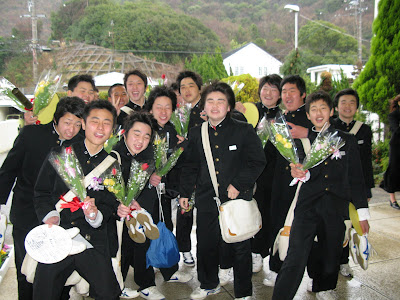Sometimes the frustrations of living in such a different culture can get to you and bring about feelings of isolation as a minority in an extremely homogeneous population. Recently, I feel like I have been more aware of this fact and have been affected by a wave of culture shock that's compounded by cold weather, an absence of classes during this time of the year (i.e. LOTS of free time at work), and the longing for feelings of anonymity in my community. Granted, I will without a doubt miss those instances when people stop me at the grocery store to tell me that I'm tall, students not being able to comprehend that my eyes really are green and that I'm not wearing color contacts, or people almost crashing their cars as they stare at the foreigner who is jogging beside the rice fields. Although I'll never be able to truly relate to these things, I can at least understand that they happen and not be thrown of just because I can't locate the source of why they occur.
For me, my routine during the winter is simple. I bike to and from work, spend time trying to stay warm by the kerosene heater in the staff room (without feeling lightheaded from the fumes), pick up the usual things from the grocery store, make dinner, and get ready to do it all over again. I generally like the simplicity of this time of the year and because there's no residential central heating here, getting outside and riding my bike for an hour and a half in the cold will probably keep me warmer than sitting under blankets in my apartment. However, as spring approaches, memories of what sometimes seems like a past life where I had a group of friends that I'd often see creep back into my thoughts.
I feel like Japanese culture can be analogous to a powerful locomotive running full speed ahead where those that hop on and join in this way of life are accepted as a part of the culture and those that don't are outcasts. When feeling homesick or culture shock, the 'defined' way of living around me can seem narrow and almost a binary all-or-nothing kind of thing. These feelings are also magnified when you are literally the only non-Japanese person where you work and the 'values' of straightforwardness are not accepted here the way they are in America. In fact, it's seemingly just the opposite. Conversations about what foods are delicious or how cold it is in the winter are the things that keep people united here. It's truly an amazing display of cultural cohesiveness that I could have never imagined without experiencing it firsthand over a long period of time. Of course I take part in these conversations and it makes me feel good that I can navigate through them with ease now that I would say that I have a significant understanding of Japan and its culture. But, I'll always be an outsider here and I am very far from losing sight of this fact.
There is a big difference between these recent, intermittent waves of isolation and how I dealt with similar situations last year. At this point, I understand and recognize signs of culture shock and can give myself ample time to do the things necessary to find relief. Last year's feelings at this time (when I was also experiencing the end-of-winter drag) were grounded on a desire to feel rooted in my situation in general, knowing that I had at least another year and a half in this very different life. The contrast now results in my finite time here. These feeling are still very real but are nowhere near the unidentifiable, sometimes crippling adjustments of being a first year resident.
All of these things in my head can take they cyclic tolls but can also be erased by the reason that I came here- to be a teacher. Living a life that often cannot be backed up by the rational processes of a Western mind suddenly makes sense when, after a year and a half of being their English teacher, you're at the 9th graders' graduation ceremony, standing in front of them and giving a final bow before they go on their way to high school.



So, the fact that I'm getting out of Shikoku for a few weeks starting on Friday is a good thing. Last year I was off to
New Zealand but this time I'm keeping it domestic and using the seishun 18 kippu (an inexpensive way to travel on extended breaks by local trains, mostly used by university students) to see more of the country. I'll be doing it alone, trying to get to Japan's northernmost island of
Hokkaido and, from there, hopefully spending about a week traveling around the area. I should be making plans this weekend for places to stay, etc. but I'll probably just leave it open to make these decisions upon arrival. I'm saving my
Alan Watts book for the train (11 hours just to get to Tokyo...) and looking forward to the open fields, mountains, and coastal scenes of northern Japan. Four more days of work and then it's me and my good ol' backpack.













